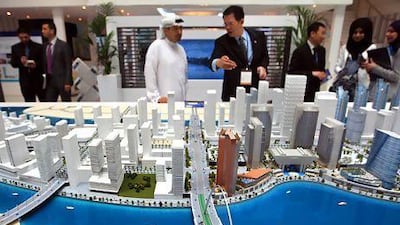I make no apologies for turning to the same subject for the second week in a row in this column. The financial free zone recently decreed by the Government of Abu Dhabi is a game-changing event in the UAE's financial and economic development and justifies as much coverage and elaboration as possible.
Late last week, the Abu Dhabi Executive Council put some flesh on the bare bones of the presidential decree. Global Marketplace Abu Dhabi (Gmad) will be a full-service financial free zone, accommodating the complete range of activities of the financial industry, from investment banking, stockbroking and capital markets to asset management and commodities trading and finance.
There may be a little work for the branding experts still to do on the name, but Gmad will have a wide-ranging remit in the financial industry, certainly as extensive as any of the other financial centres of the Gulf such as Dubai, Qatar or Bahrain.
It will have its own authority and board of directors, and crucially, it will also have its own courts and legal system, with a chief justice, an appeals court and registrar. The assumption is that the legal system will be based on English common law, the legal language of business the world over, although this is not yet confirmed.
To complete the structure, Gmad will also have its own regulator, the Financial Services Regulatory Bureau, which you can virtually guarantee will become known just as "the Bureau", lending it just the air of mystery beloved by those charged with policing financial markets.
The UAE's banking professionals, naturally, are excited by Gmad. A brand new financial centre does not come along every day, especially one backed by the financial firepower of an energy-rich Gulf state. But many are rightly reserving judgement until further details emerge.
Two classes of professionals are especially enthusiastic at these early stages of Gmad: the lawyers and the headhunters.
The lawyers see a huge increase in work for clients weighing the new centre. Some have been involved at an earlier stage, having helped the Abu Dhabi authorities on framing the legal groundwork on which Gmad will operate.
Those who are there already are counting their blessings; others, outside the Al Maryah zone, will think again about establishing at least a presence to join the 10 or so big law firms in place now.
For the headhunters, it could be a bonanza similar to the one that exploded in Dubai in 2004 when the DIFC was set up. The lines are already twitching in New York, Sydney, Hong Kong and London - not to mention Dubai just an hour away.
International recruitment searches for judges, top lawyers and experienced regulators, as well as well-paid bankers, are the stuff of headhunters' dreams. Next year's bonus pool in the headhunting community is already a matter of speculation.
In all this excitement, it seems almost churlish to point out that there are still serious unresolved issues involving Gmad.
One is the position of the regulator. Financial centres regard independent regulatory capability as one of the badges of status all must have, but there is a danger of adding another layer of expensive bureaucracy in a country that prides itself on its success in the "ease of doing business" leagues in the region. The "Bureau's" function must be carefully defined.
The other is the role of the UAE Central Bank, itself a regulator. As an important part of the country's financial infrastructure, the Central Bank will already have played a key role in preparing the way for the Gmad concept.
But now it must decide how much further its involvement should extend. Given its chief mission is the care and well-being of the dirham economy, perhaps, some experts are arguing, it should limit its presence on Al Maryah.
These concerns may be dismissed as details in the exciting Gmad project, but as ever the devil is in the detail.

